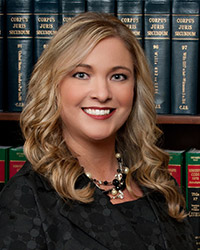


Article by 2019 - 2020 CABA President
Posted March 2020Preparing for the worst is part of our job description. We, lawyers, are specially trained to minimize the worst-case scenario. When drafting that contract, that last will & testament, that antenuptial agreement, that settlement agreement or that employee handbook, we in the legal profession work hard to advise clients so the worst case is not their reality. That preparation is based on our life experiences and years of training. Yet this global pandemic is unlike anything that has occurred in any of our lifetimes. The result is that we are admittedly unprepared.
As a child growing up in southern California, earthquakes happened every so often, some much bigger and scarier than others. I was accustomed to regularly conducted earthquake drills at school. Each school year, we had to bring an earthquake emergency kit to school with items like water, non-perishable food, a flashlight, tissues, and extra clothes. We hoped for the best but prepared for the worst. I remember times of severe drought in California, city officials ordered severe water restrictions. You couldn’t water your lawn, everything was brown. You couldn’t wash your car. We took showers with buckets to reuse water. The motto in many homes when going to the restroom was “if it’s yellow, let it mellow. If it’s brown, flush it down.” Then came the wildfires. We hoped for the best but prepared for the worst. Perhaps ten years from now blue light phototherapy will be an option on our cell phones and portable ventilators will be household products. Whatever preparation looks like going forward, all of our lives have significantly changed in a short period of time and there are presently more uncertainties than answers.
Just ten days ago, I was off enjoying spring break in New Orleans. I was not yet paying close attention to China or Italy; I thought the media was just being dramatic. Scientists and the World Health Organization were warning of the risks of not going all-out to stop the virus but I was too busy to listen yet. How quickly my perception changed. For Hinds County, a state of emergency has been declared on a national, state and local level. All gatherings of 10 people or more are being canceled or postponed throughout the country for the eight weeks due to the rapid spreading of COVID-19. For the first time in over a hundred years, the US Supreme Court announced it is postponing arguments. The situation has shifted dramatically in a single week and I’m realizing our country is facing what will be the most profound changes to the daily lives of Americans during peacetime. Companies like Hanes have jumped in to make medical masks. GM offered their plants to make ventilators; it seems fitting given that they produced tanks for our country during World War II. US factories helped us win WWII and they are now being called upon to win this war against COVID-19.
Our new normal seems to be social distancing, a term we all now know, and even more screen time. These are unprecedented times and we are all unsure how to prepare; the full impact on the legal system remains unclear. Because the American judiciary is so decentralized, there is no single contingency plan that governs all courts in case of an emergency. Most state and federal courts are making up their own rules as they go. In most states, individual trial and appeals courts are struggling to meet their legal obligations without contributing to the spread of the virus. You can’t just shut down the public safety function in a crisis. Our state court system must remain operational; our Constitution says so. See Miss. Const. Art. 3, §§ 24, 25, 26, and 26A. To what degree the court is operational varies from one courtroom to the next. Our Mississippi court system feels like it is in pause mode. Many courts have suspended non-essential hearings, but we struggle to effectively clarify which hearings qualify as essential. For the most part, court administrators are trying to limit their footprint, while still carrying out emergency issues. There are matters that must proceed — bail hearings, juvenile detention hearings, requests for temporary restraining orders in domestic violence cases and attempts to remove abused children from their homes, etc.
Most chancery courts have cleared their dockets for the next two weeks or longer; only emergent and/or essential matters are being heard. Ex parte matters are being entertained via email. Telephonic conferences are replacing status conferences and hearings whenever possible. Circuit courts are on hold until after May 15th, unable to impanel jurors or move inmates. As for motion practice, both circuit and chancery courts are ruling on pleadings as much as possible. As for CABA, the board has voted to postpone the golf tournament and cancel all other scheduled events for the next eight weeks, including our April Membership Meeting, April Spring Social and our Evening Honoring the Judiciary in May — every event scheduled for the rest of CABA’s fiscal year.
My advice for practitioners during this time — get comfortable using email as the sole way to communicate with the court and staff. Agree to and request the court to consider ruling on the pleadings whenever possible. Figure out how you and your employees can work from home and figure it out now. This pandemic is forcing the legal profession to change and adapt rapidly. This is a minute by minute situation and we lawyers must be receptive to changing quickly. By doing so, the legal profession can help prepare for the worst. Meanwhile, I hope each of us will continue to hope and pray for the best.
Take Care,
Tiffany Grove